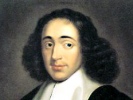
Sacred Texts Philosophy Spinoza Index Previous Next
Buy this Book at Amazon.com


Correspondence, by Benedict de Spinoza, [1883], at sacred-texts.com
Further arguments for the unity of God.
Distinguished Sir,—In your last letter, written on March 30th, you have excellently elucidated the point, which was somewhat obscure to me in your letter of February 10th. As I now know your opinion, I will set forth the state of the question as you conceive it; whether there be only a single Being who subsists by his own sufficiency or force? I not only affirm this to be so, but also undertake to prove it from the fact, that the nature of such a Being necessarily involves existence; perhaps it may also be readily proved from the understanding of God (as I set forth, "Principles of Cartesian Philosophy," I. Prop. i.), or from others of His attributes. Before treating of the subject I will briefly show, as preliminaries, what properties must be possessed by a Being including necessary existence. To wit:—
I. It must be eternal. For if a definite duration be assigned to it, it would beyond that definite duration be conceived as non-existent, or as not involving necessary existence, which would be contrary to its definition.
II. It must be simple, not made up of parts. For parts must in nature and knowledge be prior to the whole they compose: this could not be the case with regard to that which is eternal.
III. It cannot be conceived as determinate, but only as infinite. For, if the nature of the said Being were determinate,
and conceived as determinate, that nature would beyond the said limits be conceived as non-existent, which again is contrary to its definition.
IV. It is indivisible. For if it were divisible, it could be divided into parts, either of the same or of different nature. If the latter, it could be destroyed and so not exist, which is contrary to its definition; if the former, each part would in itself include necessary existence, and thus one part could exist without others, and consequently be conceived as so existing. Hence the nature of the Being would be comprehended as finite, which, by what has been said, is contrary to its definition. Thus we see that, in attempting to ascribe to such a Being any imperfection, we straightway fall into contradictions. For, whether the imperfection which we wish to assign to the said Being be situate in any defect, or in limitations possessed by its nature, or in any change which it might, through deficiency of power, undergo from external causes, we are always brought back to the contradiction, that a nature which involves necessary existence, does not exist, or does not necessarily exist. I conclude, therefore—
V. That everything, which includes necessary existence, cannot have in itself any imperfection, but must express pure perfection.
VI. Further, since only from perfection can it come about, that any Being should exist by its own sufficiency and force, it follows that, if we assume a Being to exist by its own nature, but not to express all perfections, we must further suppose that another Being exists, which does comprehend in itself all perfections. For, if the less powerful Being exists by its own sufficiency, how much more must the more powerful so exist?
Lastly, to deal with the question, I affirm that there can only be a single Being, of which the existence belongs to its nature; such a Being which possesses in itself all perfections I will call God. If there be any Being to whose nature existence belongs, such a Being can contain in itself no imperfection, but must (by my fifth premiss) express every perfection; therefore, the nature of such a Being seems to belong to God (whose existence we are bound to affirm by Premiss VI.), inasmuch as He has in Himself all
perfections and no imperfections. Nor can it exist externally to God. For if, externally to God, there existed one and the same nature involving necessary existence, such nature would be twofold; but this, by what we have just shown, is absurd. Therefore there is nothing save God, but there is a single God, that involves necessary existence, which was to be proved.
Such, distinguished Sir, are the arguments I can now produce for demonstrating this question. I hope I may also demonstrate to you, that I am, &c.
Voorburg, 10 April, 1666.